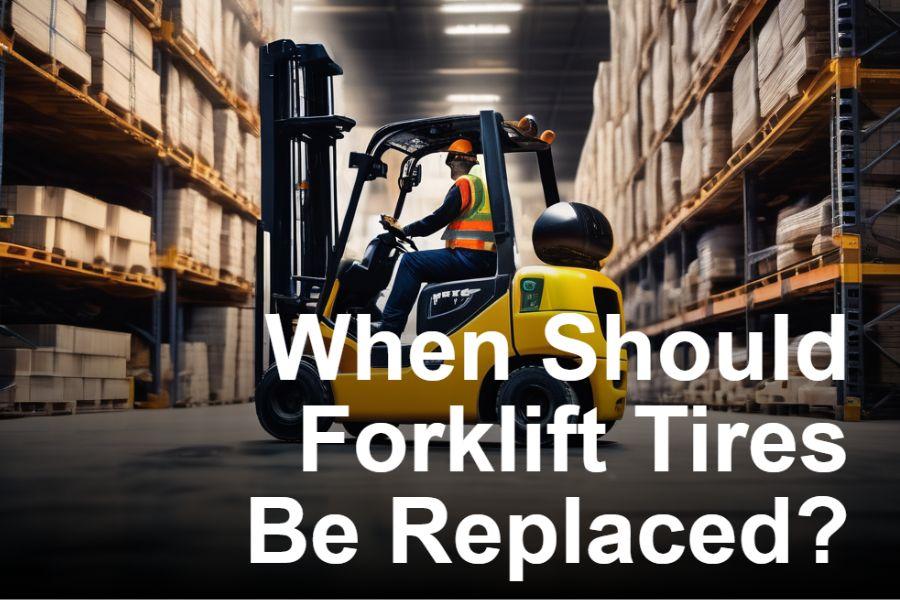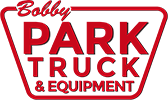Information Request
Need more information about one of our vehicles? Simply fill in the form below and we'll be in touch.
Rather Make a Phone Call?
(205) 759-4891We will be happy to meet your needs.
When Should Forklift Tires Be Replaced?

An easy way to enhance productivity and ensure forklift operators stay productive is by replacing forklift tires. Replacing forklift tires timely helps improve fuel efficiency, makes forklift operators less tired, and increases the lifespan of your forklift.
If you do not replace your forklift’s tires timely, the transmission will have to work harder, and the operator will get tired sooner. But how do you know when to replace forklift tires?
Although there are different types of forklift tires, such as press-on band, resilient solid, and pneumatic, some common warning signs indicate your tires need replacement.
These warning signs include chunking, tearing on the lines, flat spots, and wear over the wear line. Let’s discuss these warning signs in detail.
Signs Your Forklift Tires Need Replacement?
Cracks, Cuts, or Chunks
One of the most obvious signs that your forklift tires need replacement is the presence of cracks, cuts, or missing chunks on the tire surface.
These damages can occur due to normal wear and tear, exposure to harsh environments, or improper usage. Cracks and cuts weaken the tire's structural integrity, increasing the risk of blowouts and accidents.
Missing chunks can also affect the balance and stability of the forklift, making it unsafe to operate.
Flat Spots
Flat spots on forklift tires indicate that tire replacement may be necessary. Flat spots can develop when forklift skids or slides abruptly, causing friction and heat buildup on a particular tire area.
This can result in uneven wear and compromise the tire's performance and longevity. Flat spots can also cause vibrations and discomfort during operation, affecting the operator's productivity and safety.
Worn Over the Wear Line
Truck Forklift tires are equipped with wear indicators, commonly known as wear lines, to help operators determine when replacement is needed.
If the tire tread is worn down to the wear line or below, it indicates that the tire has reached the end of its service life and should be replaced immediately.
Operating a forklift with tires worn beyond the wear line can lead to reduced traction, increased braking distance, and decreased stability, posing serious safety risks in the workplace.
Tearing on the Sidewalls
Tearing or damage on the sidewalls of forklift tires is another sign that replacement may be necessary.
Sidewall damage can occur due to impacts, abrasions, or prolonged exposure to sunlight and chemicals. Torn sidewalls compromise the tire's structural integrity, making it more susceptible to punctures, blowouts, and rapid air loss.
Additionally, sidewall damage can lead to uneven tire wear and reduced traction, affecting the forklift's performance and safety.
Reduced Stability and Traction
Perhaps the most critical sign that your Truck forklift tires need replacement is reduced stability and traction during operation.
Worn or damaged tires can compromise the forklift's ability to grip the ground securely, increasing the risk of skidding, sliding, and tipping over. Reduced traction can also affect the forklift's stopping distance and maneuverability, making it difficult to control in tight spaces or on uneven terrain.
To ensure the safety of operators and prevent accidents, it is essential to replace forklift tires at the first sign of reduced stability or traction.
Importance of Keeping Up with Forklift Tire Inspection
Regular tire inspections are crucial for maintaining a safe and efficient workplace.
By keeping up with tire inspections, you can identify signs of wear, damage, or deterioration early on, allowing you to address issues before they escalate. This helps prevent accidents, injuries, and equipment damage, ensuring the safety of operators and other personnel.
Additionally, proper tire maintenance can prolong the lifespan of your forklift tires, reducing the frequency of replacements and saving you time and money in the long run.
At Truck Forklifts, we can inspect your vehicles thoroughly and recommend whether your tires need replacing. Not only this, but we have a complete parts department and a service department to keep your truck running well for years. In our service department and body shop, we can modify any truck to meet your specific business specifications.
So, if you are looking for a trusted service provider for tire replacement, we are the ones for you.
To Sum Up
In summary, knowing when to replace forklift tires is crucial for maintaining productivity and safety in the workplace. Timely replacement improves fuel efficiency, reduces operator fatigue, and extends the lifespan of forklifts.
Signs like cracks, flat spots, worn tread, sidewall damage, and reduced stability indicate the need for replacement. Regular tire inspections are essential to catch these signs early and prevent accidents.
At Truck Forklifts, we offer thorough inspections and reliable tire replacement services to keep your operations running smoothly and safely. Trust us to keep your forklifts in top condition for years to come.
Frequently Asked Questions
What is the life of a forklift tire?
Forklift tires typically last around 2,000 to 10,000 hours, depending on usage, load weight, and surface conditions.
What is the wear limit on forklift tires?
The wear limit on forklift tires is typically around 3/16 to 1/4 inch of remaining tread depth.
How do I know if my forklift tires could be better?
You can tell if your forklift tires are bad by checking for signs of wear, such as uneven tread wear, cracks, bulges, or visible damage. Additionally, if the tires are losing air pressure frequently or if the forklift feels unstable during operation, it may indicate that the tires need replacing.

